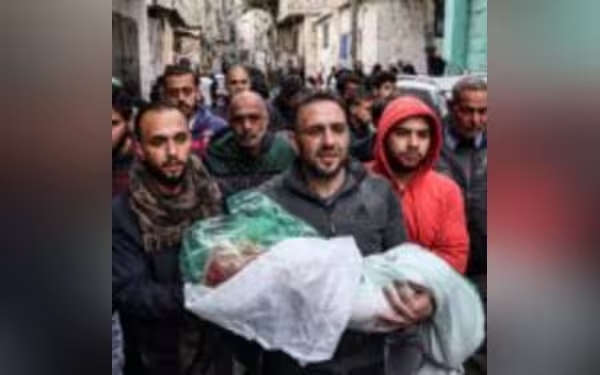Saturday, November 16, 2024 05:34 PM
Gaza Conflict: A Year of Violence and Humanitarian Crisis
- Over 43,000 lives lost in Gaza conflict.
- Israel faces accusations of war crimes.
- Humanitarian crisis deepens as violence escalates.
 Image Credits: pakistantoday
Image Credits: pakistantodayThe Gaza conflict marks a year of violence, claiming over 43,000 lives and deepening the humanitarian crisis amid accusations of war crimes against Israel.
The ongoing conflict in Gaza has reached a critical juncture, marking a year of devastating violence that has claimed the lives of over 43,000 individuals. This tragic situation has raised serious questions about the security and purpose of Israel, a nation that was established with the intent of providing a safe haven for the Jewish people. However, the relentless cycle of violence has not only failed to secure Israel but has also led to a broader regional instability.
Israel's military actions have extended beyond the Gaza Strip, engaging in confrontations with Hezbollah in Lebanon. The recent killing of Hezbollah's leader, Hassan Nasrallah, has further complicated Israel's position, trapping it in a web of conflict that seems to have no clear objectives. The Israeli Defence Forces (IDF) have faced accusations of committing war crimes, raising concerns about accountability and the moral implications of their actions.
One of the most pressing challenges for Israel is the seemingly insurmountable task of eliminating Hamas, the governing body in Gaza. The IDF's goal of ensuring that Hamas can no longer pose a threat to Israeli citizens appears increasingly unattainable. This is compounded by the fact that Hamas receives support from external allies, including Iran, which complicates the situation further. Iranian President Masoud Pezeshkian has expressed a desire to avoid escalating the conflict, yet the reality remains that Iran's nuclear ambitions could pose a significant threat to regional stability.
As the conflict continues, the humanitarian crisis in Gaza deepens. Thousands of Gazans have lost their lives, and many more have been left homeless, struggling to survive amidst the destruction of their communities. Schools and hospitals, which were already under strain, have been further devastated, leaving the population vulnerable and in dire need of assistance.
The sense of impunity displayed by the Israeli military is alarming. Reports of war crimes, including the killing of civilians and the destruction of property, have been documented and shared widely on social media. This blatant disregard for accountability raises questions about the moral compass guiding Israel's actions. The IDF claims to have robust mechanisms for accountability, yet the lack of transparency and the refusal to allow international oversight from bodies like the International Criminal Court (ICC) suggest a troubling trend of exceptionalism.
Historically, Israel has taken a strong stance against those accused of war crimes, as evidenced by its pursuit of Adolf Eichmann, a key figure in the Holocaust. Eichmann was captured and tried in Israel, ultimately facing execution for his role in the systematic murder of six million Jews. Ironically, while Israel seeks justice for past atrocities, it appears reluctant to hold its own military accountable for current actions that may qualify as war crimes.
As the conflict drags on, it becomes increasingly clear that the ongoing violence serves the interests of certain political leaders rather than the broader Israeli population. Prime Minister Benjamin Netanyahu's administration may benefit from the distraction of war, allowing him to maintain power and avoid facing the consequences of his leadership failures. However, this strategy comes at a significant cost, with lives lost and communities shattered.
The situation in Gaza is a stark reminder of the complexities of conflict and the urgent need for a resolution that prioritizes peace and stability. The cycle of violence not only endangers the lives of those directly involved but also threatens the broader region. As the world watches, it is imperative that all parties involved seek a path towards dialogue and understanding, rather than perpetuating a cycle of destruction. Only through genuine efforts to address the root causes of the conflict can there be hope for a lasting peace that benefits all.













